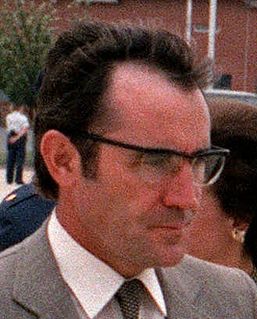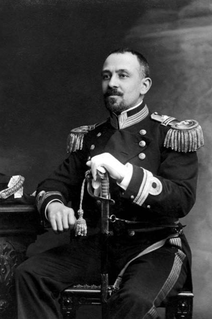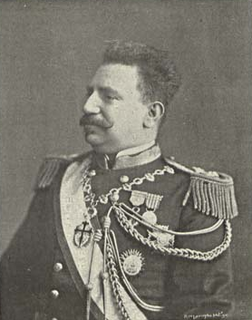 W
WErnesto Augusto de Melo Antunes junior, GCL was a Portuguese military officer who had a major role in the Carnation Revolution of 25 April 1974.
 W
WJosé Botelho de Carvalho Araújo was a Portuguese Navy officer and colonial administrator who died in action against a German U-boat in World War I.
 W
WAntónio Maria Baptista, GCTE was a Portuguese military officer and politician. When he was lieutenant, he fought in Portuguese Mozambique, during the wars of pacification against the Vátuas, led by Gungunhana. He was promoted to colonel in 1917. He fought the monarchist uprising of 1919, and was nominated Minister of War in the same year. He, then, distinguished himself during a series of violent strikes, and a year later was nominated and became President of the Ministry, on 8 March 1920. He died suddenly while in office, after a Council of Ministers reunion, on 6 June 1920. He was posthumously promoted to general and was decorated with the Great-Cross of the Order of the Tower and Sword.
 W
WArtur Carlos de Barros Basto, he made a career in the military and as a writer, who published several works related to Judaism. He was an important Jewish leader and one of the people who established the Jewish Community in Porto and assisted the construction of the Kadoorie Synagogue, the biggest Synagogue in Iberian Peninsula. Furthermore, he helped the return of Crypto-Jews to the Jewish people and, during World War II, helped Jewish refugees escape the Holocaust.
 W
WRaul Germano Brandão was a Portuguese writer, journalist and military officer, notable for the realism of his literary descriptions and by the lyricism of his language. Brandão was born in Foz do Douro, a parish of Porto, where he spent the majority of his youth. Born in a family of sailors, the ocean and the sailors are recurring themes in his work.
 W
WManuel de Brito Camacho a Portuguese military officer, writer, publicist and politician, who among other positions, was Minister of Public Works, Commerce and Industry (1910–1911) and Republican High Commissioner to Portuguese Mozambique. He was the founder of the Partido Unionista, and director of the newspaper A Luta, the mouthpiece of the same Party.
 W
WMajor-General Sir Neil Campbell CB was a British Army officer who fought during the Napoleonic Wars, administered several British colonies, and escorted Napoleon Bonaparte into exile.
 W
WAntónio Óscar Fragoso Carmona, BTO, ComC, GCA, ComSE, was a Portuguese Army officer and politician who served as the 96th Prime Minister of Portugal and 11th President of Portugal (1926–1951). Prior to those posts he served as Minister of War in 1923.
 W
WMartim Afonso de Castro was a Portuguese Viceroy of India. He commanded the Portuguese Navy in the Battle of Cape Rachado and fought over the present day Malaccan exclave of Tanjung Tuan in 1606.
 W
WAntonio Manuel Maria Coelho (1857–1943) was a Portuguese military officer of the Portuguese Army and politician during the period of the Portuguese First Republic. Among other posts, he served as governor of Portuguese Angola and governor of Portuguese Guinea. He became Prime Minister after the Noite Sangrenta terrorist assassinations of prominent state figures on 19 October 1921. A Freemason, he was co-author, along with João Chagas, of the work História da Revolta do Porto.
 W
WFrancisco Higino Craveiro Lopes, GCTE, ComC, GCA, was a Portuguese politician and military man. Decorated with the Order of the Bath and the Royal Victorian Chain, he was the 12th President of the Portuguese Republic between 1951 and 1958.
 W
WHumberto da Silva Delgado, ComC, GCA, GOA, ComA, OA, ComSE, GCL, OIP, CBE was a General of the Portuguese Air Force, diplomat and politician.
 W
WDom Duarte Pio, Duke of Braganza is a claimant to the defunct Portuguese throne, as the head of the House of Braganza. The Miguelist Braganzas, to whom Duarte Pio belongs as great-grandson of King Miguel I, is a cadet branch of the House of Braganza. With the extinction of male-line dynasts descended from Queen Maria II in 1932, King Miguel's descendants became the only male-line Braganzas remaining and the closest male-line heirs to the defunct Portuguese throne.
 W
WAntónio dos Santos Ramalho Eanes, GColL GCL GColTE CavA is a Portuguese general and politician who was the 16th President of Portugal from 1976 to 1986.
 W
WCarlos Viegas Gago Coutinho, GCTE, GCC, generally known simply as Gago Coutinho was a Portuguese geographer, cartographer, naval officer, historian and aviator. An aviation pioneer, Gago Coutinho and Sacadura Cabral were the first to cross the South Atlantic Ocean by air, from March to June 1922, from Lisbon, Portugal, to Rio de Janeiro, Brazil.
 W
WHenrique Galvão was a Portuguese military officer, writer and politician. He was initially a supporter but later become one of the strongest opponents of the Portuguese Estado Novo under Salazar.
 W
WJosé Maria de Sousa Horta e Costa, CavA, OA, OSE, also known as José Maria de Sousa Horta e Costa (de) Almeida e Vasconcelos, was a Portuguese soldier, politician, and diplomat. He was colonial Governor of Macau and India.
 W
WLuís da Costa Ivens Ferraz was a Portuguese equestrian and cavalry officer. He competed in the 1928 Summer Olympics.
 W
WRoberto Ivens was a Portuguese explorer of Africa, geographer, colonial administrator, and an officer of the Portuguese Navy.
 W
WInácio Luís Madeira de Melo was a Portuguese military officer. He served in the office of Governor of Arms, and led Portuguese troops based in Salvador in fighting the War of Independence of Brazil in that province until his capitulation on 2 July 1823, when the troops retreated to Portugal.
 W
WCarlos Galvão de Melo was a Portuguese military officer from the Portuguese Air Force.
 W
WAndré Furtado de Mendonça was a captain and governor of Portuguese India, and a military commander during Portuguese expansion into Ceylon, India, Indonesia and Malacca.
 W
WLuís da Silva Mouzinho de Albuquerque was a Portuguese military officer, engineer, poet, scientist and politician, who distinguished himself during the Liberal Wars and in the conflicts that marked Portugal's history in the first half of the 19th century. He served as the Minister of the Kingdom during the liberal regency of Pedro of Braganza. This was the most prominent post inside the government at that time, which made him the Prime Minister of Portugal in all but name. He was also several times minister and deputy minister during the Constitutional Monarchical period. Among other offices, he served as Chief of the National Mint, captain-general and governor of Madeira, and inspector-general of public works. He was the grandfather of Joaquim Augusto Mouzinho de Albuquerque, a military officer and colonial administrator.
 W
WDomingos Augusto Alves da Costa Oliveira was a Portuguese general and politician.
 W
WSidónio Bernardino Cardoso da Silva Pais CavC OA CavA was a Portuguese politician, military officer, and diplomat, who served as the fourth President of the First Portuguese Republic in 1918. One of the most divisive figures in modern Portuguese history, he was referred to by the writer Fernando Pessoa as the "President-King", a description that stuck in later years and symbolizes his regime.
 W
WHenrique Mitchell de Paiva Cabral Couceiro was a Portuguese soldier, colonial governor, monarchist politician and counter-revolutionary; he was notable for his role during the colonial occupation of Angola and Mozambique and for his dedication to the monarchist cause during the period of the First Portuguese Republic through the founding of the Monarchy of the North.
 W
WJoaquim Pereira Pimenta de Castro, 10th Count of Pimenta de Castro was a Portuguese army officer and politician. He was a career military officer reaching the position of General, also graduated in Mathematics by the University of Coimbra. In 1908, he was nominated commander of the 3rd Military Region, in Porto. After the proclamation of the Republic on 5 October 1910, he was Minister of War, for only two months, in 1911. He had to resign due to the monarchist incursion of Henrique de Paiva Couceiro. An independent, he was chosen by President Manuel de Arriaga to be the President of the Ministry of a government, who would rule without the parliament, where the Portuguese Republican Party, led by Afonso Costa had the majority. His government, with the support of the moderate Evolutionist Party and the Republican Union, and also conservative military factions, was in office from 28 January to 14 May 1915. It was overthrown by the military movement of 14 May 1915, supported by the Republican Party, which also caused the resignation of President Manuel de Arriaga.